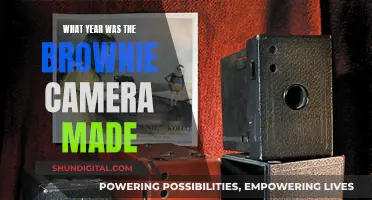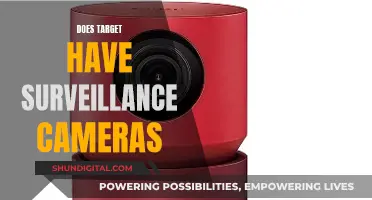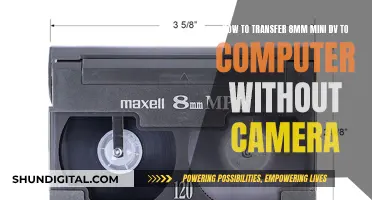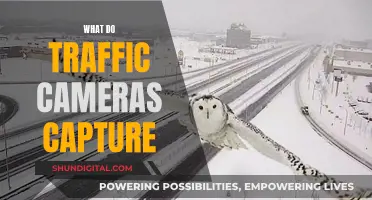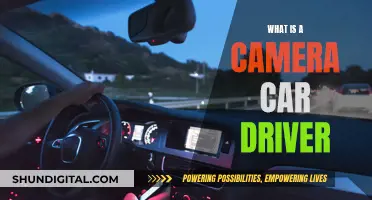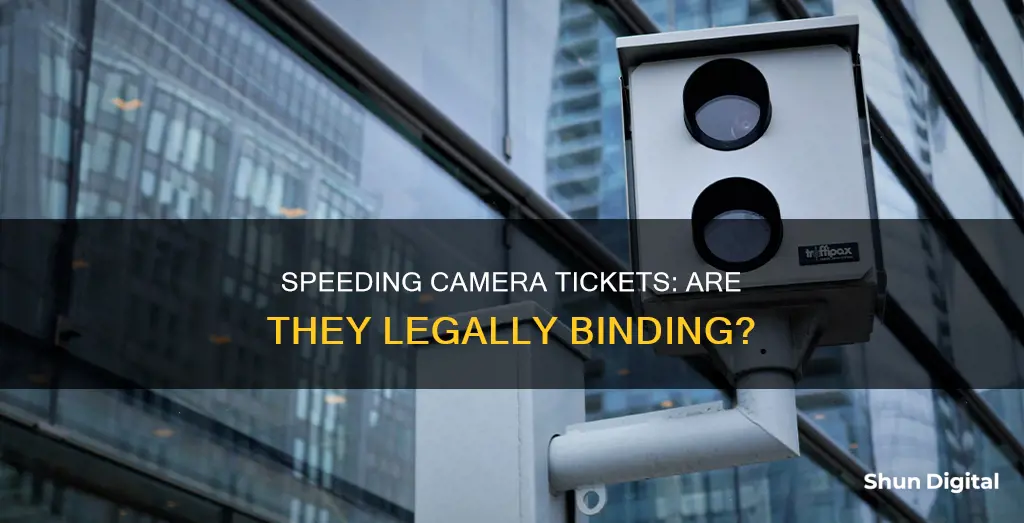
The use of cameras to enforce speeding and other traffic violations is a contentious issue. While some argue that these measures are effective in reducing crashes and improving road safety, particularly in school zones, others view them as an invasion of privacy. Camera-issued tickets are generally treated as parking tickets and do not result in points on a driving record or insurance consequences. However, non-payment can lead to collection actions and holds on vehicle registration. Understanding the specific laws and regulations regarding camera speeding tickets in your jurisdiction is essential, as they may vary across different locations.
| Characteristics | Values |
|---|---|
| Camera Tickets | Legally equivalent to parking tickets |
| Red Light Camera Tickets | Do not result in points on your driving record |
| Owner of the Car | Responsible for the ticket |
| Evidence | Pictures and videos of the alleged camera violation |
| Non-Payment | May result in a collections action and a hold on registering your vehicle |
| Affidavit | Registered owner(s) filing an affidavit stating that they were not the driver at the time of the violation |
What You'll Learn
- Camera-issued tickets are legally equivalent to parking tickets
- Camera tickets do not appear on driving records
- Failure to respond or pay a camera ticket will not result in a license suspension
- You can view evidence of your violation online
- You can file a Declaration of Non-Responsibility if you were not driving the vehicle

Camera-issued tickets are legally equivalent to parking tickets
Camera-issued tickets are not always legally enforceable, and their enforceability depends on the laws of the state in question. In some states, such as Texas, camera-issued speeding tickets are not legal and cannot be issued. However, in other states, camera-issued tickets are legally enforceable and carry the same weight as a parking ticket or non-moving violation.
For example, under Washington law, 'automated safety camera tickets' are legally equivalent to parking tickets and do not affect a person's driver's license status or insurance rates. These tickets are typically issued for speeding in school zones or failure to stop at a traffic light. While they can result in a collections action and a hold on registering your vehicle if left unpaid, they will not lead to a license suspension.
The legality of camera-issued tickets has been contested by attorneys, leading to various court decisions and statutes regarding their use. Some states have laws prohibiting municipalities from using traffic violation cameras, while others allow local governments to set up their own camera programs. In some cases, the use of cameras may be restricted to certain areas, such as school or work zones, or require the posting of signs to inform drivers of their presence.
It's important to note that even if a camera-issued ticket is not legally enforceable in a particular state, it may still be mailed to the registered owner of the vehicle. The registered owner is typically presumed to be the driver at the time of the infraction and may need to file an affidavit stating otherwise to avoid any consequences.
Revitalizing Lithium-Ion Camera Batteries: Pro Tips for Photographers
You may want to see also

Camera tickets do not appear on driving records
Camera speeding tickets are generally enforceable, but there are variations in how they are enforced across different states and countries.
In most states, camera tickets are treated like non-moving violations, such as parking tickets or tickets for expired registration. Non-moving violations do not go on your driving record, and neither do camera citations. This means that your auto insurance rates won't be affected unless you live in a state that treats photo tickets as moving violations, such as Arizona, California, or Oregon.
In Seattle, camera tickets are processed like parking tickets and will not appear on your state driving record. However, if you fail to pay a camera ticket, the Department of Licensing (DOL) may place a hold on your vehicle registration.
Similarly, in Ontario, speed camera tickets are not added to your driving history because the camera doesn't identify the driver. The ticket is issued to the vehicle owner, but no demerit points are added to their record. As a result, insurance companies don't factor in speed camera tickets when calculating insurance premiums.
Red light camera tickets also typically don't result in points on your driving record, although there are exceptions in certain states like Arizona, California, and Oregon.
Instax Cameras: Where Are They Manufactured?
You may want to see also

Failure to respond or pay a camera ticket will not result in a license suspension
Camera speeding tickets are generally enforceable, but the consequences of failing to respond or pay a camera ticket vary depending on the location. In Seattle, camera tickets are processed like parking tickets and won't appear on your state driving record. However, unpaid tickets may cause the Department of Licensing to place a hold on your vehicle registration.
In Mississauga, failing to respond to a ticket within 30 days can result in a conviction in your absence. If you don't pay the fine within 45 days, it will be sent to a collection agency, and additional fees will be incurred. While a driver's license suspension is mentioned as a consequence of unpaid fines, it is not explicitly stated that this applies to camera speeding tickets.
In some cases, such as with school bus camera tickets in certain states, there is ambiguity about the enforceability of camera speeding tickets. A legal opinion suggests that these tickets can be disregarded since they are issued by a private company and not the police. However, legislation can vary by state and city, so it's important to refer to local laws and regulations.
It is worth noting that failing to respond or pay a camera ticket may still result in financial penalties and administrative burdens, even if it doesn't directly lead to a license suspension. To avoid further complications, it is generally advisable to respond to and resolve any traffic violations in a timely manner.
The Best Ways to Store Camera Batteries
You may want to see also

You can view evidence of your violation online
If you've received a speeding ticket, you may want to see the evidence against you. This is especially important if you plan to challenge the ticket. Evidence that a photograph shows can be vital to your case.
In the case of a speeding ticket issued through a camera, you can expect to see a calibration certificate for the device and a photograph of the incident. If the camera is found to have been operating correctly, this certificate, along with the photo, can be used to prosecute you. If it's a manually operated device, you may also see a Certificate of Training for the operator.
You should receive a Notice of Intended Prosecution (NIP) or a Notice of Liability, which will include information on how to view the evidence online. For example, in Seattle, you can view pictures and videos of the alleged violation at www.violationinfo.com using the citation number and PIN provided on the Notice of Infraction.
If you haven't received a notice or are unable to access the evidence online, you can contact the police in writing to request to see the evidence. They are not obligated to show you the evidence before the court hearing, but most police forces will cooperate and provide some information. Remember, you can change your plea at any time, even after seeing the evidence.
Alternative Charging Methods for Your Zimodo Camera
You may want to see also

You can file a Declaration of Non-Responsibility if you were not driving the vehicle
Camera-based speeding tickets are enforceable, and the owner of the car is responsible for the ticket, regardless of who was driving. However, if you were not driving the vehicle when the violation occurred, you can file a Declaration of Non-Responsibility. This is a sworn statement, under penalty of perjury, that the vehicle was not in your care, custody, or control at the time of the violation. This declaration only applies to traffic camera violations and cannot be filed by companies or organizations.
You can file the declaration online or submit it by mail, email, or fax. The form can be downloaded and attached to an email sent to the relevant authority, or mailed to the address provided on the form. You may also be required to provide the citation or notice number, date, signature, and other relevant information. It's important to note that you are not legally required to identify the person who was driving the vehicle. The registered owner is presumed to be the driver, and by filing the declaration, you are stating that the vehicle was not in your care at the time of the violation.
The court may respond to your declaration by cancelling the ticket or scheduling a hearing, depending on the circumstances and the history of camera violations associated with the vehicle or owner. It's recommended to submit the declaration by the due date specified on the notice of infraction to ensure a timely response from the court.
It's worth noting that camera tickets are typically processed like parking tickets and do not appear on your state driving record. However, unpaid tickets may result in a hold on your vehicle registration. Additionally, these tickets do not carry long-term consequences, such as affecting your insurance rates or driving record.
The Evolution of Cameras: From Concept to Creation
You may want to see also
Frequently asked questions
Yes, camera speeding tickets are enforceable in Seattle. The Seattle Department of Transportation places speed cameras near elementary and middle schools when students are arriving and leaving.
If you don't pay a camera speeding ticket, the Department of Licensing can place a hold on your vehicle registration.
Red light camera tickets are treated like parking tickets and won't impact your driving record or insurance rates. You can view the evidence against you online and decide to pay or challenge the ticket.
Red light camera tickets in NYC won't result in points on your driving record. You can view the evidence online and decide to pay or challenge the ticket within 30 days.


